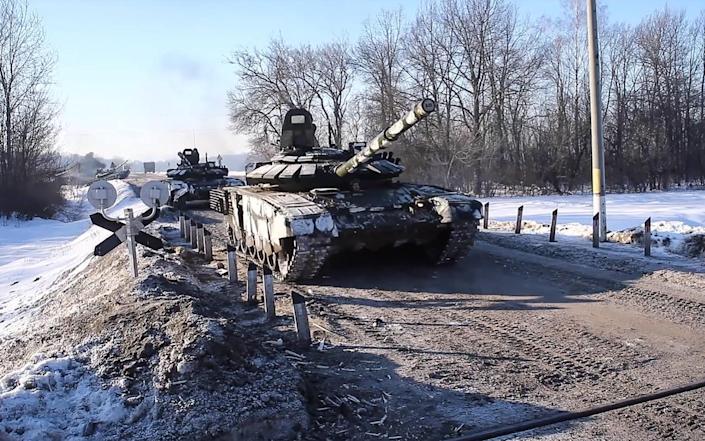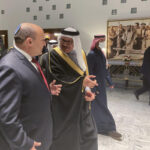
Vladimir Putin wrongfooted the world again on Tuesday with the surprise announcement Russia is withdrawing some of its troops from around Ukraine.
The question facing the West now is whether the move is a sign the crisis is abating — or just another tactical manouvre on the part of the Kremlin.
On the face of it, the announcement appears to fit the view that the presence of the troops has always been a bluff on Mr Putin’s part.
“February 15, 2022, will go down in history as the day when Western war propaganda failed,” a Russian foreign ministry spokeswoman crowed on Tuesday. “They were humiliated and defeated without a single shot.”
The taunt was directed at US predictions Russia would invade on Wednesday, but it may have contained a deeper message.
Mr Putin has every reason to believe he has secured a major strategic victory without going to war.
He has reasserted Russia as a superpower, brought Western leaders scurrying to meet with him in Moscow and left the whole world hanging on his next move.


He appeared to give the game away with Monday’s weird staged meeting for the television cameras, in which his foreign minister, Sergei Lavrov, reported back that the chances of a diplomatic solution were “far from exhausted” and Russia should keep going.
Indeed, Mr Putin has been transparent about this tactic for months. In November he told Russian diplomats “tensions” with the West were a good thing and that it was “important for them to remain in this state for as long as possible.”
But the question is: why stop now? Perhaps, like an experienced gambler, Mr Putin just wants to quite while he is ahead. But the timing seems odd.
Only a day ago he seemed on the verge of an even bigger win, after the Ukrainian ambassador to Britain suggested his country could be ready to abandon its ambitions of Nato membership to avoid war, only for Kyiv to slap him down.
That was Mr Putin’s central demand, yet now he appears to be backing down just when it is within reach.
One possibility is that negotiations are taking place than we don’t know about. Ukraine’s ambassador to Germany made an intriguing comment on Tuesday when he called for Olaf Scholz to “bang with his first, but maybe also with his shoe if necessary” on Mr Putin’s table during his visit to Moscow.


It was an odd remark that seemed designed to call to mind Nikita Kruschchev, who famously banged his shoe on a desk at the United Nations, and who was Soviet leader during the 1962 Cuban Missile Crisis, the moment the US and the Soviets came closest to war.
The Cuban Missile Crisis was resolved with a secret deal agreed via back channel negotiations led by Robert F Kennedy.
It is possible there are talks being conducted through similar back channels of which we know nothing today.
It is worth noting that Boris Johnson and Joe Biden said there was still hope for a diplomatic solution on Monday night, just ahead of Russia’s announcement it was pulling troops back.
But it is important to be cautious about reading too much into Russia’s announcement.
“All warfare is based on deception,” Sun Tzu wrote in The Art of War. “When using our forces, we must appear inactive; when we are near, we must make the enemy believe we are far away; when far away, we must make him believe we are near.”
Far from being a sign that the crisis is over, a Russian withdrawal could be a classic feint. Mr Putin could be laying the ground to claim he was pulling his forces out when he was forced into action against his will.
It is a little too soon to declare the crisis over yet.
Sign-up to our Russia-Ukraine crisis webinar and chat to Telegraph journalists on Wednesday February 16 at midday




